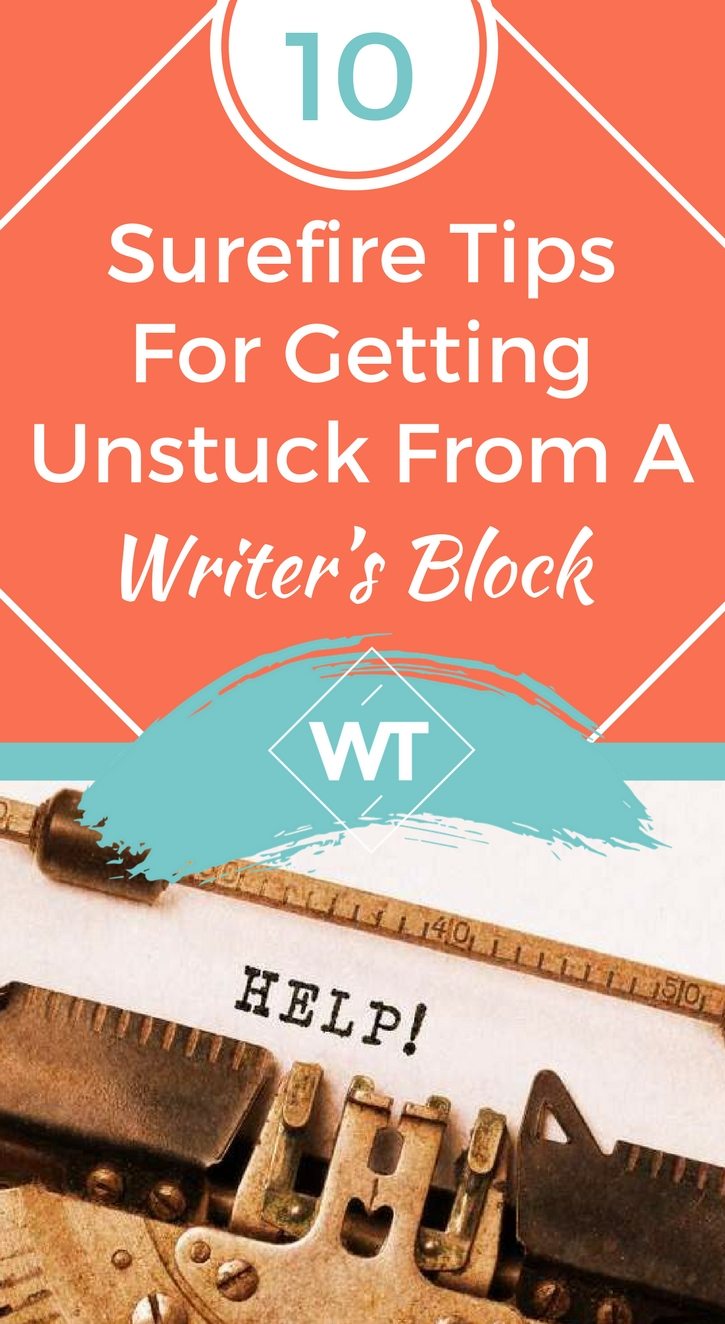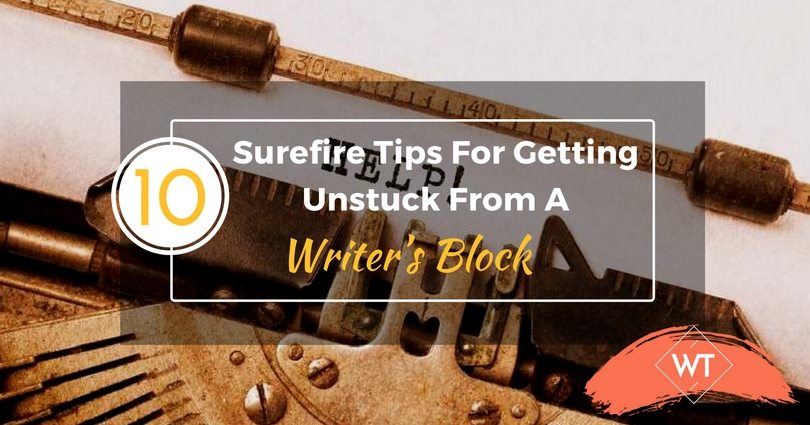10 Surefire Tips For Getting Unstuck From A Writer’s Block

There are myriad reasons why you might feel stuck or have writer’s block while writing a book. You could even feel paralyzed enough to prevent you from starting.
What follows are 10 potential causes of writer’s block and 10 tips for overcoming it. (Although I refer to book-writing throughout this article, everything I talk about applies equally to all writing projects, regardless of medium or genre, size or scope.)
Do any of these sound familiar?
- You feel overwhelmed by how little you know about the book you feel called to write
- You feel overwhelmed by the scope of the book you feel called to write
- You’re spinning your wheels trying to plan, plot or outline your book
- You’re listening to your inner critic, your frightened inner child or the echoes of those who have judged or criticized you in the past, rather than to the voice of your Muse and the voice of your book
- You’re avoiding an emotionally or technically challenging chapter, section…or book
- You’re finding it difficult to continue without conducting additional research
- You’re afraid of hurting or offending someone with what you feel called to write
- You’re overthinking or over analyzing this part of your book…or the whole book
- You’re doubting, second-guessing, judging or censoring yourself
- You’re writing about something you don’t really care about or have lost interest in
There’s one best way through all this potential writer’s block. In fact, it’s the best way through all potential blocks. What is it? To write! I know what you’re saying. You’re saying that if you could write, you wouldn’t be blocked! I get it. But what I’m saying is that you can write, and I’ll show you how.
I call the foundation for everything I teach about writing, “Writing on the Muse Stream,” and it’s guaranteed (yes, guaranteed) to get you writing and keep you writing—past all blocks, barriers and feelings of stuck–ness.
I call it the Muse Stream because I believe that when we surrender to our Muse, creativity pours through us as effortlessly as water in a free-flowing stream.
Here’s how it works: When you’re writing, whatever you’re writing, allow your pen to keep flowing across the page or your fingers to continue dancing across your keyboard, without stopping for any reason. Never let writer’s block stop you.
- Don’t stop to correct spelling punctuation or grammar. There’s a time for editing, revising, correcting and refining. That time is not in the midst of your creative flow. If you normally have auto-spell-check and grammar-check enabled as you write on your computer, tablet or phone, toggle them off. You don’t want any sounds or visual cues to suggest that you might be making any “mistakes” as you write.
- Don’t stop to second-guess your plot, theme, concept, direction or any aspect of your book. Trust your book and the voice of your muse to keep guiding your forward, and they will.
- Don’t stop to grope for the word that’s on the tip of your tongue or to search for synonyms. Leave a blank space or type xxxx and keep writing. A thesaurus can be your best friend as you edit and revise. It’s no kind of friend as you are flowing through your first draft.
- Don’t stop to research perceived holes in your plot or narrative. Insert a brief note about what’s missing, set aside a separate time for research and write on…without stopping!
- Don’t stop to structure your book, to figure out its theme or to plan, plot or organize its contents. Keep your pen or fingers moving and trust that the innate wisdom of your book will make itself known to you as you write.
- Don’t stop for any of life’s distractions. Keep your writing space and time as distraction-free as you can manage. Switch off or mute all computer and mobile notifications. Close all unnecessary applications and browser windows. Shut down your email program. Turn off your cell phone or put it into airplane or “do not disturb” mode. Still have a landline? Turn off the ringer and send all incoming calls to voicemail. Create a “Writer at Work: Do Not Disturb” sign for your door and encourage anyone you live with to respect it.
- Don’t stop to think, worry or stress for any reason, including about where your next word is coming from, whether your book will be published, who’s going to read it or how it might to judged. If you’re writing on the Muse Stream, that next word will always come…and the book’s future will take care of itself.
- Don’t stop—for anything. Stopping (for any reason whatsoever) takes you out of the free flow of your creative mind and pushes you into the censoring, doubting, second-guessing judgment of your hypercritical or fearful mind. Nearly every block can be traced back to fear, self-judgment, self-criticism or second-guessing. Don’t let yourself go there!
I know: Sometimes, we can’t help but stop. Writer’s block is a formidable foe. Sometimes, our pens simply won’t touch down on the page or our fingers hover motionless over the keyboard. Sometimes, we just feel paralyzed.
10 ways to beat Writer’s Block
When you find that you can’t keep going—it happens to all of us, here are those 10 surefire ways I promised you that will reignite your creative fire, free up your Muse Stream, and keep the words of your book flowing easily onto the page or screen.
1. Repeat
Repeat anything to keep your pen or keyboard in motion. Repeat the last word or sentence your wrote before you got stuck. Repeat the first sentence of the previous paragraph. Repeat the first sentence of your day’s writing, the first sentence of your chapter or the first sentence of your book.
Write/repeat anything, even if it’s “I don’t know what to write” or “This feels dumb” or “Repetition is silly” or “Why do I have to write this book?” or “Mark David Gerson is an idiot!” Continue to repeat whatever you’re repeating until the flow starts up again. If you repeat without stopping, the flow will start up again.
In later drafts, you can discard the words, phrases and sentences that make no sense or that have no place in your manuscript. Some, you might be surprised to discover, will remain.
2. Free-Associate
Like repetition, free association keeps you writing while tricking your logical mind into relinquishing control of a creative process it cannot understand. Begin with the final word of the last sentence you were able to write and let it trigger another word—whatever leaps to mind, however silly.
From “silly,” the final word of my previous sentence, I free-associate billy…club…rub…rub-a-dub-dub…three men in a tub…bathtub…shower…flower power…hour…time…rhyme…mime…clime…chime…bell…ring…sing and on and on. Let each word trigger the next, the next, the next and so on.
If you relax into it and let yourself have fun with it, your flow will return. Again, delete what doesn’t belong when you get to a subsequent draft.
3. Talk Jabberwock
“Jabberwocky,” if you recall your Alice in Wonderland, is the nonsense poem that Alice discovers in Through the Looking Glass.
’Twas brillig, and the slithy toves
Did gyre and gimble in the wabe;
All mimsy were the borogoves,
And the mome raths outgrabe.
When you feel stuck, a little jabberwocking of your own can get you going again.
Make up your own words…words that sound funny…words that sound weird…words that don’t exist in any known dictionary (like “jabberwock” used as a verb). Make one up, write it down…then another…then another…then another.
This playful act tricks your inner censor into dropping its guard. Soon, nonsense words will become Muse-sense words and your flow will resume. As with the previous tips, it’s about writing anything to silence your frightened or hypercritical self, which always keeps the flow alive.
4. Go foreign
Is English not your first language? Are you fluent enough in a second language to switch linguistic gears for a while? Give it a try. Just remember that whatever the language and whether it’s real or made up, the key is to keep writing without stopping. Any way you can do that will help restore the natural free-flow of your Muse Stream.
5. Breathe
If you’re stuck in your writing, I can almost guarantee you are also stuck in your breathing. Are you holding your breath? Has your breathing become shallow? Are you hyperventilating?
It’s time to focus your awareness on your breath: Inhale deeply, hold it for a few counts, then let it go. All of it. Do it again. This time, write “I am breathing in” as you inhale and “I am breathing out” as you exhale.
Continue writing your breath until you relax back into the flow.
Remember: It doesn’t matter what you write. What matters is that you are writing…without stopping!
6. Write blind
Close your eyes, breathe deeply and write without watching your hand or hands, your screen or your notepad. Removing your attention from the external act of writing and placing it on your breath will carry you inward, away from the source of your anxiety and toward the source of your words and book.
- On a desktop computer? Switch off or dim your screen or cover it with a dishcloth or towel.
- On a laptop? Dim or cover your screen.
Two more options:
- Dictation: If your computer, tablet or cell phone has a dictation application or feature, trying speaking into your device, without looking at the screen. When you’re finished, however, be sure to check the output, just in case it your dictation has not been correctly transcribed. Fix the transcription errors only! Do not edit!!
- Eyes Closed: Whether you’re writing longhand or typing into a computer, you can always shut your eyes. (This is harder to do on a mobile device.)
However you proceed, remember to breathe, remember to turn the pages if you’re writing longhand and remember to keep feeling for the F and J notches if you’re using a traditional keyboard.
Important Caveat: If you are writing with your eyes closed, it’s easy to get into trouble. When writing longhand, you might forget to turn the page and write over what you’ve already written. On a computer or tablet you could hit the wrong keys. If your device does not auto-save, you could hit the wrong key sequences when saving manually. I know: I’ve done all these! Proceed with caution, save often and back up your work.
7. Get out of your rut
Are you writing on your computer? Switch to your tablet. Or get away from your electronic devices altogether and try writing longhand for a change of pace.
Are you writing longhand? Exchange your stodgy, blue- or black-ink pen for something colorful, playful, childlike. How about colored pencils or markers? Or crayons? How about different paper? Or turn your page sideways or upside down. Or write in a spiral or around the edges of the paper. Or try doodling through your stuckness. Once again, do anything to keep that pen moving.
8. Change venues
Where do you normally write? If it’s at a desk in your office or study, move into the living room, kitchen, dining room or bedroom…or out of the house altogether. How about a park bench or cafe table? How about setting yourself in front of an inspiring piece of art at a gallery or museum? Or in front of the monkey enclosure at the zoo? Or write in transit—on a random, open-ended bus or subway ride.
Back when I was living in Nova Scotia and feeling stuck while working on The Moon Quest, my first novel, I would get in the car drive over North Mountain to Baxters Harbour on the Bay of Fundy and let the ocean tell me what to write next. A one-day change of venue was generally all it took to put me back on track.
9. Move on
If one part of the book is holding you back, move on to another—be it to another part of the section that’s giving you trouble or to another section altogether. Return to this one in an hour, in a day, or in a few days—whenever you feel ready or after you have carried out the necessary research, if a research-deficit is what has stopped you. If you have stopped because this part of the book is emotionally challenging, perhaps it’s time to…
10. Explore
Journal on the Muse Stream to explore why you feel stuck. Use a writing prompt like “I can’t continue because” or “I feel stuck because” or “I’m afraid to keep going because.” Or get into a meditative space and, still on the Muse Stream, enter into a meditative “dialogue” with your book. In any of those instances, let whatever emerges help guide you back to your manuscript and back into the flow.
If none of those approaches works, use your journal to explore whether you still have the same drive and enthusiasm for this book that you had at the outset. If you don’t, perhaps it’s time to set this project aside (for now or forever) and seek out one that excites and impassions you.
By the way, keeping a journal as you work on your book and using it to explore your fears, feelings and frustrations can be an effective way to stave off writer’s block before it happens.
Have none of these techniques worked for you?
Is your book still dammed up somewhere inside you? Do you still feel paralyzed and unable to continue (or even start)?
Sometimes, the best thing to do to re-prime a gummed-up creative pump is to walk away. Perhaps you need to walk away for ten minutes. Perhaps you need to walk away for the rest of the day. Or perhaps it’s time do something unrelated to your book.
If researchers at Stanford University are right, your best bet might be to go for a stroll. A recent study found that walking for just eight minutes can substantially boost creativity and that your ability to generate creative ideas continues long after the walk is over. You might prefer a nature walk, but the Stanford study found no measurable difference between pacing around a drab office or ambling around a leafy campus. So just get away from your writing space and walk. Anywhere!
You have no energy for walking? Take a bath or shower. Read a book for pleasure. Read an author who inspires you. Watch a movie. Do you have other creative pursuits?
Leave writing behind for a few hours and engage in a different Muse-like pastime: drawing, photography, singing, furniture-making, gardening, cooking—whatever will keep you in a different kind of creative flow until the time is right to return to your book.
Whatever you do, don’t let your stuck-ness discourage or prevent you from moving forward you! Continue to explore ways to keep your flow flowing freely, and write your book! Writer’s block be damned.









Leave a Reply